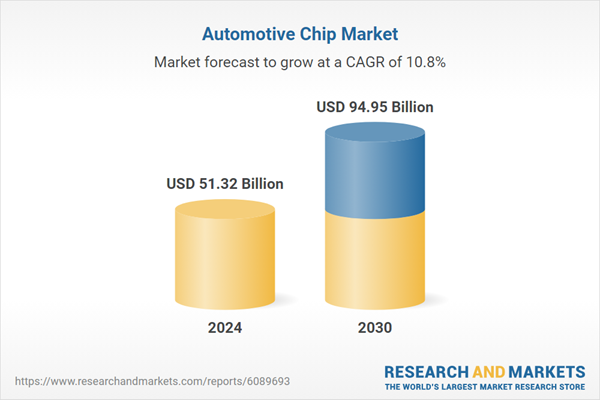Speak directly to the analyst to clarify any post sales queries you may have.
10% Free customizationThis report comes with 10% free customization, enabling you to add data that meets your specific business needs.
The push toward autonomous driving and connected mobility solutions further intensifies demand for powerful chips capable of handling complex data analytics and AI applications. The industry is witnessing a move toward miniaturized and integrated solutions such as System on Chip (SoC) platforms, which support compact designs and low power consumption - especially crucial for electric and hybrid vehicles. However, the sector faces persistent challenges, particularly in supply chain management and the need for continuous technological innovation to keep pace with evolving vehicle architectures and consumer expectations.
Key Market Drivers
Increased Adoption of Electric Vehicles (EVs)
The growing shift toward electric mobility is a key factor driving demand in the automotive chip market. EVs depend heavily on semiconductor technology for essential operations, including battery management systems, motor controllers, and power conversion units. As governments implement stringent emissions regulations and offer incentives for EV adoption, automakers are increasing production of electric models, further amplifying chip demand. This surge requires specialized chips that offer higher efficiency, precision, and reliability, which in turn propels research and development in the semiconductor sector. The evolution of EV platforms is thus a central force in shaping the automotive chip landscape.Key Market Challenges
Supply Chain Disruptions
Supply chain volatility remains a significant hurdle for the global automotive chip market. The sector continues to feel the effects of semiconductor shortages triggered during the COVID-19 pandemic, which led to production halts and delayed vehicle deliveries worldwide. Automotive manufacturing’s reliance on just-in-time inventory practices, coupled with the geographic concentration of chip fabrication facilities, has exposed vulnerabilities in the supply network. Mitigating future disruptions requires strategic actions such as regional diversification of supply chains, investment in local semiconductor manufacturing, and building inventory resilience. Ensuring long-term supply stability is essential for meeting the rising demand driven by automotive digitalization.Key Market Trends
Miniaturization of Automotive Chips
Miniaturization is a defining trend in the automotive chip industry. As vehicles become more compact and digitally advanced, there is increasing demand for smaller chips that deliver greater functionality in limited space. Miniaturized chips not only support space-saving vehicle designs but also offer enhanced energy efficiency, which is critical for the performance of EVs and hybrid models. This trend is driving innovation in semiconductor packaging and fabrication techniques, as manufacturers aim to create powerful, multifunctional chips that meet the requirements of modern vehicle systems, including infotainment, safety, and autonomous features.Key Market Players
- NXP Semiconductor NV
- Infineon Technologies AG
- Renesas Electronics Corporation
- STMicroelectronics NV
- Toshiba Electronic Devices & Storage Corporation (Toshiba Corporation)
- Texas Instrument Inc.
- Robert Bosch GmbH
- Micron Technology
- Analog Devices Inc.
- ROHM Co. Ltd.
Report Scope:
In this report, the Global Automotive Chip Market has been segmented into the following categories, in addition to the industry trends which have also been detailed below:Automotive Chip Market, By Vehicle Type:
- Passenger Cars
- Commercial Vehicles
Automotive Chip Market, By Type:
- Analog ICs
- Microcontrollers & Microprocessors
- Logic ICs
Automotive Chip Market, By Application:
- Chassis
- Power Electronics
- Safety
- Body Electronics
- Infotainment
- Other Applications
Automotive Chip Market, By Region:
- North America
- United States
- Canada
- Mexico
- Europe & CIS
- Germany
- France
- U.K.
- Spain
- Italy
- Asia-Pacific
- China
- Japan
- India
- South Korea
- Middle East & Africa
- South Africa
- Saudi Arabia
- UAE
- Turkey
- South America
- Brazil
- Argentina
Competitive Landscape
Company Profiles: Detailed analysis of the major companies present in the Global Automotive Chip Market.Available Customizations:
With the given market data, the publisher offers customizations according to the company’s specific needs. The following customization options are available for the report.Company Information
- Detailed analysis and profiling of additional market players (up to five).
This product will be delivered within 1-3 business days.
Table of Contents
Companies Mentioned
- NXP Semiconductor NV
- Infineon Technologies AG
- Renesas Electronics Corporation
- STMicroelectronics NV
- Toshiba Electronic Devices & Storage Corporation (Toshiba Corporation)
- Texas Instrument Inc.
- Robert Bosch GmbH
- Micron Technology Inc.
- Analog Devices Inc.
- ROHM Co. Ltd.
Table Information
| Report Attribute | Details |
|---|---|
| No. of Pages | 183 |
| Published | May 2025 |
| Forecast Period | 2024 - 2030 |
| Estimated Market Value ( USD | $ 51.32 Billion |
| Forecasted Market Value ( USD | $ 94.95 Billion |
| Compound Annual Growth Rate | 10.8% |
| Regions Covered | Global |
| No. of Companies Mentioned | 10 |









